A poem sent to us by Adjei Agyei-Baah on the theme of the Ashanti royal house. The Ashanti people live within a wealthy, gold-rich region of Ghana. Otumfuo is an honourary title bestowed upon Ashanti rulers when they ascend the throne. The Ashanti Empire was officially established in 1701 by the Ashanti King Osei Tutu and his adviser and High Priest, Okomfo Anokye.
The Golden Stool (Ashanti-Twi: Sika ‘dwa) is the royal throne of the Ashanti king, and is also believed to house the spirit of the Ashanti nation. According to the legends of the oral tradition, the Golden Stool descended from heaven and into the lap of Okomfo Anokye when the Ashanti army defeated their rivals, the Denkyira, in 1701. The entire surface of the Golden Stool is inlaid with gold and hung with bells to warn the king of dangers.
In 1863 the British army attacked the Ashanti kingdom to take control of the Gold Coast. Six hundred troops massed on the border of the Ashanti kingdom during the dry season, but left it too late to launch their invasion. When the rain season began the troops rapidly came down with malaria and dysentery and eventually abandoned their supplies and retreated without a shot being fired. This led the then Ashanti King, Asantehene Kwaku Dua, to remark “The white man brings his cannon to the bush, but the bush is stronger than the cannon”.
He who knows not the Otumfuo
Let me present him
He has mounted the throne
Dissolved many a throne
To concretize his own
His Golden Stool (1)
Is a handmade of the gods
His cloth is a woven one of a kind
The secret only Ananse knows (2)
He passes like a train of army ants
With every door shutting behind him
His umbrella is a shade of baobab
The defenseless seeks refuge and lives
And His appellation is a long record of epic
And for those who care to know:
“The white man brought his cannons to His bush,
But His bush was stronger than his cannons”.
This is the poem in the Ashanti Twi dialect.
Deɛ ɔnnim otumfoɔ no
ɔma me nkyerɛ no:
na ɔforoo abaanwa!
bubuu ahennwa nkaeɛ
de kyekyeree ne deɛ
na ne Sikadwa Kofi
yɛ abosom nsa ano anwinnieɛ
na ne awenntwoma da mu fua.
na ɛho ahintasɛm deɛ
Ananse nkutoo na ɔnim.
na nipadɔm a ɛdi n’akyi te sɛ nkranee.
na ɛpono biara mu to wɔ n’akyi!
na ne kyiniiɛ krɔn te sɛ ɔdadeɛ nwunu
na nea ɔdwane kɔtoa no, wɔgye no atenaseɛ
na ne nsammerane yɛ apawa a ɛkyerɛ n’abakɔsɛm
na wei kɔma nea ɔpɛ mpaninnsɛm ɛtie:
“Kwasi broni de n’atubena baa ne kwaeɛ mu,
nanso ne kwaeɛ no dii n’atubena no so nkunim”.
by Adjei Agyei-Baah
Adjei Agyei-Baah is a lecturer and translator at the University of Ghana School of Distance Education, Kumasi Campus, and teaches Academic Writing and Literature related courses. He is also the co-founder Africa Haiku Network and Poetry Foundation Ghana, and currently serves as the managing coeditor of The Mamba, Africa’s first international haiku Journal. He is widely anthologized, won several international awards. Adjei is an author of two books: “AFRIKU” and “Ghana 21”, and looks forward to publishing his first long verse collection “Embers of Fireflies” in 2018.
Footnotes
- His Golden Stool: The Ashanti throne.
- Ananse: In West African folktales, a popular spider god who is both devious and very wise.

